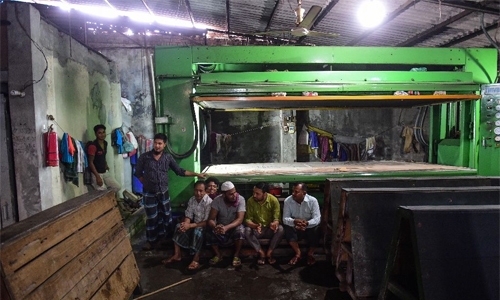Bangladesh closes one of world's most polluted places
Dhaka : A historic leatherworking quarter in Bangladesh once labelled among the most polluted places on earth was shut Thursday as police enforced a court ruling to protect a vital waterway.
Conservationists have been fighting for years to close the century-old tannery district in the capital Dhaka, which pumps thousands of litres of toxic waste directly into the city's most important river on a daily basis.
The Supreme Court ordered last month that tanneries in Hazaribagh, a neighbourhood dating to the Mughal era, had until April 6 to close before police started cutting power to the businesses.
Some tannneries had asked for more time before closing the historic district, which the industry claims employs around 30,000 leatherworkers.
"Most of the tanneries have already stopped operations. We will completely shutdown everything this weekend," tannery owners association spokesman Tipu Sultan told AFP.
The Buriganga River was once the lifeblood of Dhaka and remains a key transport passageway, but decades of eye-watering tannery waste has left it black and reeking.
Hazaribagh police chief Alim uz Zaman said his department was following orders and "had stopped raw hides from entering" the businesses on the banks of the river.
Government figures estimate that 22,000 cubic litres of foul-smelling waste used to treat animal hides is pumped into the river everyday, including the cancer-causing toxin hexavalent chromium.
Hazaribagh is so rancid it was ranked the fifth-most polluted place on earth in a 2013 list by the New York-based Blacksmith Institute. Those living and working in the neighbourhood faced elevated rates of skin and respiratory diseases, the survey found.
Human Rights Watch has also recorded instances of tanneries employing children, many of whom suffer illnesses from exposure to hazardous chemicals.
But the tannery association warned the "vicious move" would decimate the leatherwork business, Bangladesh's second-largest industry after readymade garments.
"Our lives depend on the income we make from these tanneries. The owners will face temporary losses, but we will lose our two meals a day," said unionist Mohammad Mamun.
The district was first ordered shut by the Supreme Court in 2009, before the deadline was extended until early 2011.
But only a handful of the roughly 150 tanneries in the district were closed, before the court last month ordered police to enforce its decision.
The industry will be relocated to a new industrial park just outside Dhaka but leatherworkers say it's far from ready for business.
Related Posts

